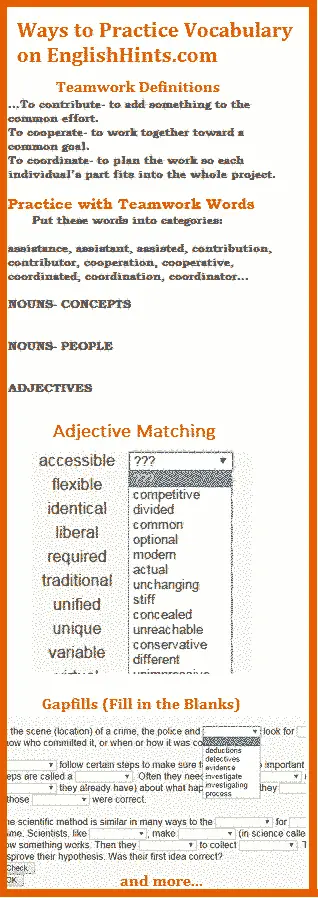3 Ways to Learn the Academic Word List
The Academic Word List (AWL) is worth understanding. Its word families (see Learn Academic Vocabulary) will help you not just to pass academic tests but to work in any professional field that requires English.
You probably already know most of the words on the first levels of the AWL, because words like ‘area,’ ‘job,’ and ‘require’ are common in daily use, not just academic texts.
The last five levels of the Academic Word List are also important, even though you will not learn many of them from everyday conversations. They're necessary for understanding textbooks, lectures, and professional discussions,
Study the AWL On EnglishHints
 Practice the Academic Word List on EnglishHints
Practice the Academic Word List on EnglishHintsBecause of the value of learning the AWL, EnglishHints offers a lot of practice with those words. Check the first 23 issues of English Detective.
You could also try the activities in the Online Vocabulary Games and How to Learn Professional Vocabulary sections. (Most include words from the AWL, including the complete pages shown in the illustration.) So do many of the quizzes and tests in ESL Quizzes.
Some of the best pages to learn and practice AWL words are:
>Scientific Method Vocabulary,
>Advanced Adjective Opposites Matching Games,and
>Teamwork and Cooperation Vocabulary.
The four pages of the Academic Vocabulary Word Lists tell you which AWL words are in each reading from the newsletter, as well as practice pages for those words.
The starred readings have comprehension questions for more practice. (They are also listed on Listening and Reading Comprehension Exercises.)
If you want to practice a specific word, look at the Alphabetical Academic Word List Vocabulary and its following pages.
They list which issue in English Detective practiced a specific word family (as well as the different forms of that word family and their parts of speech, which show when each should be used.)
Then check Back Issues for that issue number, and you can find links to readings, explanations, and exercises that practice that word and the others featured in that issue. (Practice pages for each issue are also given in the Academic Vocabulary Word Lists.)
The Academic Word List on Other Sites
Many other sites also offer AWL practice. Check the Links page on the official AWL site. This is the site I know well enough to recommend. On that page, the AWL Highlighter, AWL Gapmaker, and Compleat Lexical Tutor are great tools for teachers, though they would be harder to use for individual study.
Books that Teach the AWL
If you prefer offline practice, there are several excellent books that teach Academic Word List vocabulary in context. I have used and highly recommend Focus on Vocabulary: Mastering the Academic Word List by Diane and Norbert Schmitt, two ESL teachers.
It teaches 24 AWL words per chapter in seven units of four chapters each. The fourth chapter in each unit teaches a skill like dictionary use and gives more practice on the words from that unit. . (So it skips 66 of the best-known AWL words like ‘area’ and ‘require,’ to concentrate on the less-known words.)
Each chapter begins with an academic reading selection and then has several practice activities: matching words with definitions, recognizing the different word family members (adapt, adaptation, adaptable), working with collocations (words often or almost always used together), etc.
The one reservation I have is that the first edition, which I used, did not include the answers to the exercises. It mentioned a separate (teachers?) book with the answers, but I have not seen that for sale. I don’t know if the second edition includes the answers or not.
Amazon.com also listed several others with very good reviews, most for $30-40 new, but Academic English Vocabulary for International Students by Bill Walker is much less. It offers a look inside and what I saw looked good, but I suspect at this price it might not be as thorough as some of the others.
How Not to Learn the A.W.L.
There are lots of ways to study the Academic Word List. There's also one common method that is not a good way to learn it-- or any new vocabulary. Don't try to memorize a list of words and their definitions out of context. It's difficult, boring-- and usually ineffective. It's far better to learn words in context-- seeing examples of the way they are used and other words often used with them.
Memory strategies like flash cards or word lists are O.K. as a supplement, once you have already been introduced to the words. They are a poor first step. Studying example sentences and practicing the words in context (with gap-fills or questions) work much better.
Another good way to practice is to play with them or their related word forms: classify them, match them, make up silly stories about them, draw pictures or sing about them-- anything that helps you deepen the connections between the words and their uses and meanings.
In fact, you could try a vocabulary game or activity with words from the AWL right now, on Online Vocabulary Games. It has lots of choices of subject or type of games.
Home> How to Learn Professional Vocabulary>Learn the Academic Word List.
Didn't find what you
needed? Explain what you want in the search box below.
(For example, cognates, past tense practice, or 'get along with.') Click to see the related pages on EnglishHints.
| site search by freefind | advanced |





